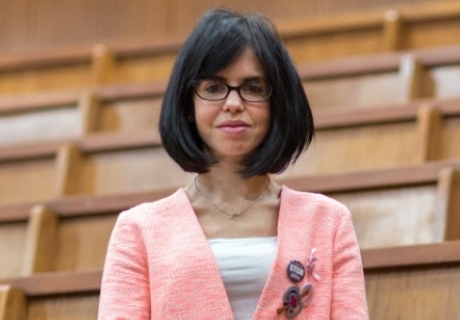From CERN to STEM, Imperial's award-winners keep on coming!

Dr Andy Rose and PhD student Jessica Wade
Tangible proof that the Department of Physics is brimming with talent as two young physicists pick up prestigious awards.
Dr Andy Rose was thrilled to receive the Spokesman's Award and Prize for Young Researcher 2015 by the CMS Collaboration at CERN, while Jessica Wade was similarly delighted to pick up an Early Career Physics Communicator Award from the Institute of Physics.
Together, they illustrate the sheer diversity of talent that the Department of Physics is incubating at Imperial.
Data analysis on an epic scale
Dr Andy Rose was recognised for his expertise in real-time data analysis and the role this played in advancing the CMS experiment at CERN.
I didn't even know I had been nominated until Professor Sir Jim Virdee came up to me at a conference and said "congratulations" - when it was explained to me, I was naturally thrilled and honoured!
– Dr Andy Rose
Department of Physics
“I didn't even know I had been nominated until Professor Sir Jim Virdee came up to me at a conference and congratulated me” says Andy. “When it was explained to me, I was naturally thrilled and honoured!”
CMS is a particle detector designed to see a wide range of particles and phenomena produced in high-energy collisions in the Large Hadron Collider. Like a cylindrical onion, it has different layers of detectors which produce data - in enormous quantities.
“CMS makes 75 million measurements 40 million times a second” Andy explains; “even processed and compressed that’s enough data to fill 40 terabytes every second. But by processing a fraction of each event in real-time, it is possible to select only the most interesting events - a process called Triggering.
Processing power meets brain power

Dr Andy Rose
To achieve this, scientists use an incredibly powerful type of processor called a Field Programmable Gate Array. However, due to their complexity, they are extremely hard to programme:
“In part, my award was for implementing new, higher-performance algorithms allowing for higher-quality analysis and thus better results”, says Andy. “It took us three months - yet another university had failed to deliver it in three years.”
The other parts of Andy’s prize recognise his role in designing the processing hardware used in several recent upgrades and the co-development of a new paradigm for building trigger systems. He credits “the freedom and encouragement to innovate” at Imperial for allowing him to do this award-winning work.
Communication fuels inspiration

Jessica Wade
By contrast, Jessica Wade received her award for tireless outreach and public engagement work.
I work in the most inspirational place in the world. I genuinely spend all of my spare time telling the public and next generation of scientists how awesome what me and my fellow researchers are up to - and trying to encourage them to join me.
– Jessica Wade
PhD student, Department of Physics
Jessica, a final year PhD student in the Nanoanalysis Group in the Centre for Plastic Electronics has already visited over 100 schools to talk about the world of physics. And she was instrumental in bringing 200 secondary school girls to Imperial for a day of workshops, talks and activities to promote STEM subjects.
As well as working with Imperial’s own Outreach team, Jessica is a member of the IC Women in Physics Group, known as The STEMettes, and she also sits on the WISE Young Women’s Board. She is leader of the organisational committee behind the International Conference for Women in Physics (IUPAP) and just received a grant from the Royal Academy of Engineering to run an all-girl Hackathon at Imperial.
If you are interested in collaborating with Jessica, helping out at the Hackathon, or hosting one of your own, please get in touch with her directly.
“I work in the most inspirational place in the world” says Jessica. “I genuinely spend all of my spare time telling the public and next generation of scientists how awesome what me and my fellow researchers are up to - and trying to encourage them to join me.”
The Department is thrilled to have such enthusiasm in its midst – and it’s something you can also encourage, by supporting Imperial students. If you’re interested in making a gift to support Physics students, please visit the Department’s giving pages.
Article text (excluding photos or graphics) © Imperial College London.
Photos and graphics subject to third party copyright used with permission or © Imperial College London.
Reporter
Imogen Ashfield
Advancement
Jenn Rowater
Advancement